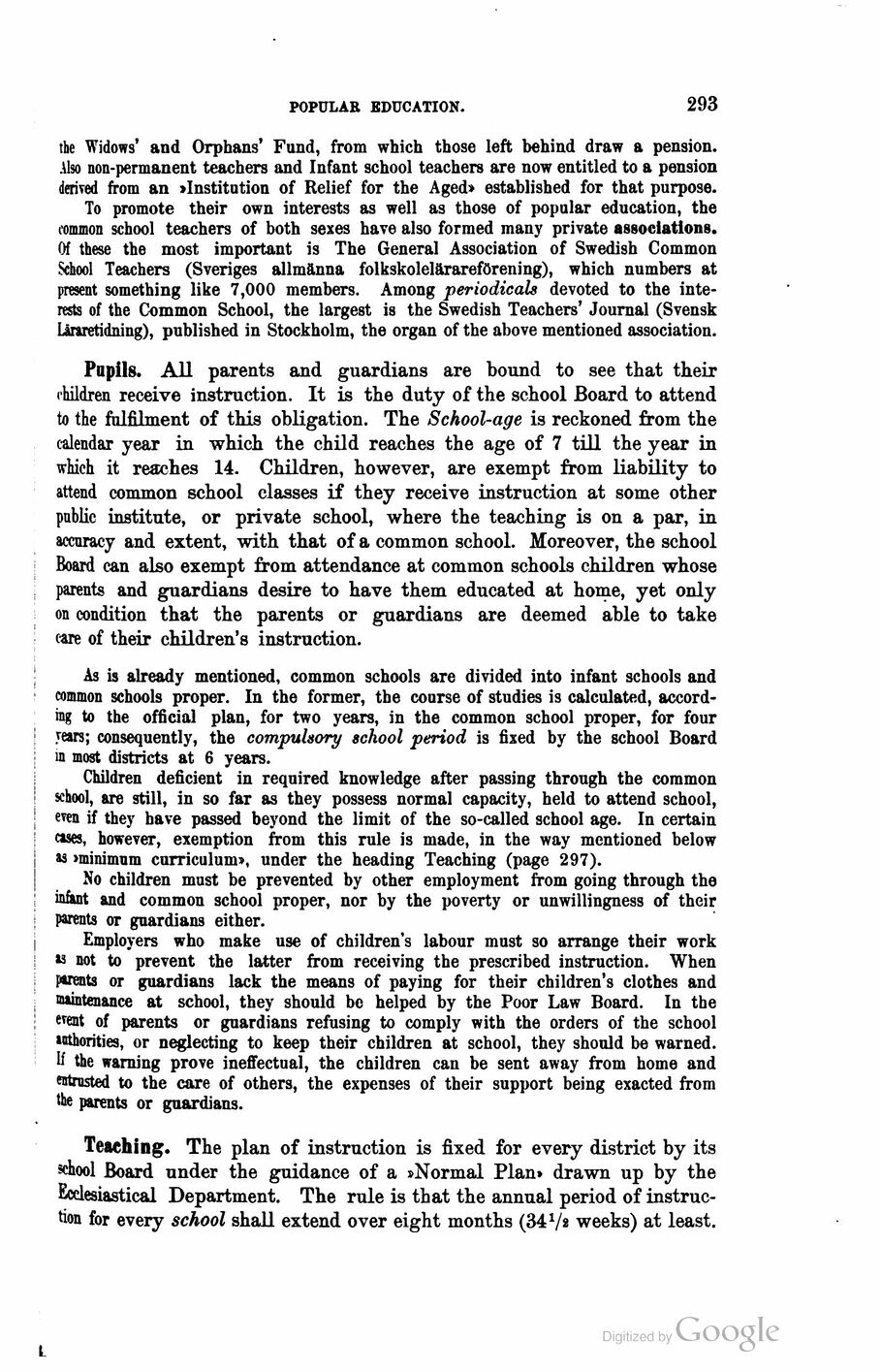
Full resolution (JPEG) - On this page / på denna sida - First part - IV. Education and Mental Culture - 1. Popular Education - Popular Education in general, by J. M. Ambrosius, Ph. D., Inspector of the Common schools of Gothenburg

<< prev. page << föreg. sida << >> nästa sida >> next page >>
Below is the raw OCR text
from the above scanned image.
Do you see an error? Proofread the page now!
Här nedan syns maskintolkade texten från faksimilbilden ovan.
Ser du något fel? Korrekturläs sidan nu!
This page has never been proofread. / Denna sida har aldrig korrekturlästs.
POPULAR EDUCATION.
293
the Widows’ and Orphans’ Fund, from which those left behind draw a pension.
Also non-permanent teachers and Infant school teachers are now entitled to a pension
derived from an »Institution of Relief for the Aged» established for that purpose.
To promote their own interests as well as those of popular education, the
common school teachers of both sexes have also formed many private associations.
Of these the most important is The General Association of Swedish Common
School Teachers (Sveriges allmänna folkskolelärareförening), which numbers at
present something like 7,000 members. Among periodicals devoted to the
interests of the Common School, the largest is the Swedish Teachers’ Journal (Svensk
Läraretidning), published in Stockholm, the organ of the above mentioned association.
Pupils. All parents and guardians are bound to see that their
children receive instruction. It is the duty of the school Board to attend
to the fulfilment of this obligation. The School-age is reckoned from the
calendar year in which the child reaches the age of 7 till the year in
which it reaches 14. Children, however, are exempt from liability to
attend common school classes if they receive instruction at some other
public institute, or private school, where the teaching is on a par, in
accuracy and extent, with that of a common school. Moreover, the school
Board can also exempt from attendance at common schools children whose
parents and guardians desire to have them educated at home, yet only
on condition that the parents or guardians are deemed able to take
tare of their children’s instruction.
As is already mentioned, common schools are divided into infant schools and
common schools proper. In the former, the course of studies is calculated,
according to the official plan, for two years, in the common school proper, for four
years; consequently, the compulsory school period is fixed by the school Board
m most districts at 6 years.
Children deficient in required knowledge after passing through the common
school, are still, in so far as they possess normal capacity, held to attend school,
even if they have passed beyond the limit of the so-called school age. In certain
cases, however, exemption from this rule is made, in the way mentioned below
as »minimum curriculum», under the heading Teaching (page 297).
No children must be prevented by other employment from going through the
infant and common school proper, nor by the poverty or unwillingness of their
parents or guardians either.
Employers who make use of children’s labour must so arrange their work
I as not to prevent the latter from receiving the prescribed instruction. When
parents or guardians lack the means of paying for their children’s clothes and
maintenance at school, they should be helped by the Poor Law Board. In the
event of parents or guardians refusing to comply with the orders of the school
authorities, or neglecting to keep their children at school, they should be warned.
11 the warning prove ineffectual, the children can be sent away from home and
entrusted to the care of others, the expenses of their support being exacted from
the parents or guardians.
Teaching. The plan of instruction is fixed for every district by its
school Board under the guidance of a »Normal Plan» drawn up by the
Ecclesiastical Department. The rule is that the annual period of
instruction for every school shall extend over eight months (34 7» weeks) at least.
<< prev. page << föreg. sida << >> nästa sida >> next page >>